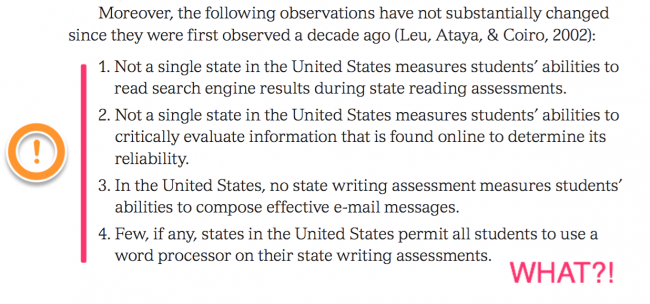Educators, I need your help.
In my last post, with the help of Dr. Diane Kern of the University of Rhode Island, I took a look at educational assessment in order to better understand it and the role it plays in the classroom and in individual education. My intention was to help parents and their students understand the nuances of assessment and evaluation and what they mean for a child’s academic future.
But school in the digital age is different. I still want to know: How are teachers assessing digital literacy? How are students performing in online environments? What specifically can teachers do to measure students’ reading comprehension when it comes to digital media?
In a chapter I recently read for my Digital Literacy course, “The New Literacies of Online Research and Reading Comprehension: Assessing and Preparing Students for the 21st Century with Common Core Standards” (PDF link), the authors write that as of 2012 schools had not updated their assessment standards to account for digital literacy. Here’s a screenshot from a section of the article.
 What? How? With the widespread use of the Common Core State Standards (which reference technology skills) how are schools not measuring students’ abilities in these areas which are critical to online reading comprehension?
What? How? With the widespread use of the Common Core State Standards (which reference technology skills) how are schools not measuring students’ abilities in these areas which are critical to online reading comprehension?
I was shocked to learn that assessments designed to test students’ abilities in key online reading comprehension areas were not mandated across states. It is definitely possible some things have changed since the essay was published two years ago, but my research thus far hasn’t shown me that this is the case. What I have found through research has led me to the conclusion that ways to assess students in these environments is being developed, researched, and tested — though assessments that measure students’ abilities in online reading environments already exist (The ORCA Project, for example). Hopefully, teachers and schools will have access to these assessments soon so they can have a reference point to better understand the skills and needs of their students.
[cjphs_content_placeholder id=”73548″ random=”no” ]Because executive functions are so inextricably linked to academic performance, I am interested in learning more about the relationship between these major thinking skills and online reading environments. When it comes to, say, an online inquiry project, a child has to employ a number of thinking skills in order to navigate and succeed in an online environment — flexibility, focus, organization, time management, planning, and working memory help them search, sift, make sense of, and think critically about the information before them. Perhaps in the coming weeks, I will develop an activity (something teachers could use in the classroom or parents could use at home) to help kids use these executive functions in an online environment.
But for now, I’m still curious to know what’s currently happening in the classrooms across the country. Going back to my question of how schools are assessing digital literacy, I’m afraid I fall short of an answer. This is where I need your help:
Are you a teacher who has come up with your own method of assessment in the digital age?
Do you know of any teacher-approved tried and true projects, assessments, and tasks out there?
Would you be willing to share these with me so I (and the rest of the staff at LearningWorks for Kids) can begin to curate a resource library for teachers full of information about how to use technologies to support the practice of executive functions in the 21st century classroom?
I’ll do my part and share any new assessment methods I come across in my classroom visits (with teacher approval of course). I hope we can work together to build a knowledge base of practices and tools.
Featured image: One Laptop per Child




